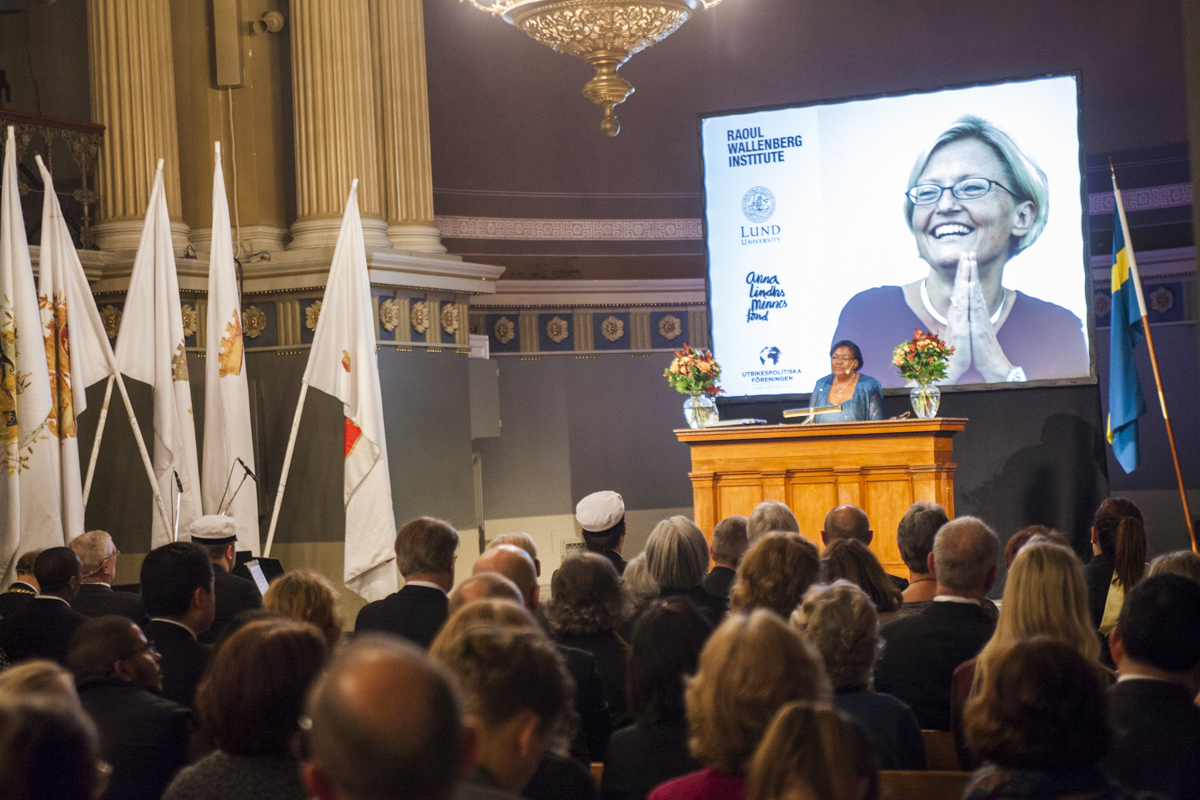Human rights are the rights you have simply because you are human. The Anna Lindh Lecture introduced the students of Lund University to Margaret Sekaggya. The lecture was titled ‘Providing a safe and enabling environment for Human Rights Defenders: Critical factors to Consider’.
On the eve of the 66th United Nations Day many students, for the first time, experienced the University House. Columns of the Tuscan-Doric order stood as if protecting us, the domes resembled a heavenly blue holding the 16 light chandeliers, students’ attire was most elegant, some even climbed a flight of stairs for a better view and before us the stage was set with the flags of Sweden and Uganda hoisted by each other. The lecturer was Mrs. Margaret Sekaggya, a Ugandan lawyer and founder of the Human Rights Centre Uganda. Until recently she was the United Nations Special Rapporteur on the Situation of Human Rights Defenders.
A human rights defender is one who individually or with others protect human rights in a peaceful manner. Mrs. Sekaggya explains, ‘it is important to note that the primary duty and responsibility to promote and protect human rights and fundamental freedoms including the rights of human rights defenders lies with the State’. In her speech, Mrs. Sekaggya identified ways through which human rights defenders could carry out their responsibilities effectively.
As defined by Mrs. Sekaggya a human rights defender can be protected in several ways. A few methods explained by her include ‘fight against impunity (exemption from punishment) and access to justice for violations against defenders, strong, independent and effective National Human Rights Institutions’ and the role of Non-State actors’ in respecting and supporting the work of defenders.
She recollects the life of a defender being vulnerable as they are ‘defending rights and speaking up against violations and abuses’. Her words can only draw images in our minds listening to the difficulties Mrs. Sekaggya might have gone through as a human rights defender.
She says, ‘defenders and their families are often intimidated, harassed, subject to surveillance, threatened, attacked, arbitrarily arrested, criminalized, tortured and ill-treated in detention, subject to enforced disappearances, and sometimes killed’.
Mrs. Sekaggya made important recommendations. She calls upon States to ‘widely disseminate the Declaration on Human Rights Defenders’. International community should ‘support the legitimate work of human rights defenders’ while ensuring ‘safe and open access to human rights bodies’.
Non-state actors should ‘familiarise themselves with the Guiding Principles on Business and Human Rights’ and human rights defenders should ‘participate in constructive dialogue with the State’ in order to ensure a safe and enabling environment for defenders. The recommendations served as a reminder to stakeholders working towards the betterment of human rights and human rights defenders.
The evening concluded just the way it began with instrumentals being played by the Akademiska kapellet or Academic Orchestra, although, there was still a sense of incompleteness. Mrs. Sekaggya should have shared some of her personal experiences and not just that of defenders in general. These stories could have been nail biting, given a chill, heart thumping, saddening or even hilarious.
It would have provided for a wholesome lecture. The coordinating organisers of the lecture alongside Lund University, the Raoul Wallenberg Institute of Human Rights and Humanitarian Law, the Anna Lindhs Minnesfond (Anna Lindhs Memorial Fund) and the Utrikespolitiska Föreningen (Association of Foreign Affairs), worked successfully in adding new knowledge to all present.
Natural Rights in the 18th century converted to Human Rights. There was a great struggle which eventually led to the formation of the Universal Declaration on Human Rights in December, 1948. Today, all of us must work to promote the universality of Human Rights.






